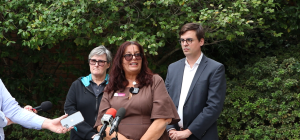A new report using data collected by the housing and homelessness sector since the end of the rental moratorium paints a worrying picture of the situation on the ground for renters.
Data and case studies, collected by the Housing Emergency Response Group over the last three months, show the devasting impact of the social affordable housing shortage on many families, with increases in rent and evictions, family and domestic violence referrals and requests for housing, support and emergency relief services.
The Housing Emergency Response group was established by CEOs from organisations providing emergency relief funding, support to renters in the private rental market, and peak bodies to identify and drive immediate solutions in partnership with government to reduce the impact and harm of the ending of the rental moratorium on the WA community.
“It has been three months since the end of the rental moratorium. Government initiatives such as the Residential Relief Grants Scheme and new investment for homelessness initiatives are important and very welcome. This report provides a picture of the ongoing issues facing individuals and families in housing stress which through partnerships with government and our sector can be addressed.” CEO Shelter WA Michelle Mackenzie said.
“The number of people seeking assistance and advice on significant debt they now find themselves in, as a result of the rent increases seen since the moratorium lifting, is of immense concern. People feel like they have no choice to agree to paying an extra $50 or $100 a week, which has a huge impact on their family budget and leaves them in incredible stress.” Financial Counsellors Network Executive Officer Melanie Every said
“Three months on and the evidence is in, and our one hope is it provides a compelling case to use the budget surplus to solve this housing shortage, and make sure services like ours currently who drawing on our reserves and at risk of funding running out have enough resources to continue.” Circle Green Community Legal Client and Corporate Manager Carmen Acosta said.
“Evidence is fundamental to developing and delivering good public policy outcomes. The purpose of this report is to support the evidence base to inform key decision makers of the size and depth of the housing emergency, and again extend an invitation to work collectively to address the housing shortage.” Centrecare CEO Tony Pietropiccolo AM said.
“Unfortunately, this Report shows many individuals and families are in enormous stress. Service providers are spending an additional 15-20% of emergency relief funding intended to help with food and essential services on supporting people with rent arrears. Ensuring adequate ongoing emergency relief funding along with increased investment in social and affordable housing is critical.” WACOSS Director of Policy Chris Twomey said.
Key findings in the report include:
- The Financial Counselling Network of WA, a network of services providing assistance with debt and financial problems reported a more than doubling in pieces of legal advice provided per month since November, rising to 889 in May 2021.
- Uniting WA report that first-time attendance at the Tranby Centre homelessness hub in the Perth city increased 100% in the month following the moratorium lifting, with a rise in women accessing help.
- Circle Green Community Legal has been overwhelmed with new clients presenting with tenancy issues and reported:
- 233% increase in the number of requests for duty lawyer services (assistance in court for tenancy issues) from six per month in October 2020 to over twenty per month in June 2021, and, including
- 975% increase in advice for rent increases clients from an average of 3 per month in March-June 2020, to an average of 30.75 per month in March-June 2021
- 173% increase in clients facing termination by lessor (up from 20 per month on average between March-June 2020 to 52 per month for March-June 2021)
- A significant increase in advice to clients for termination ‘without grounds’ (up from 1.3 per month on average in March-June 2020 to 16 per month in March-June 2021)
- WACOSS reports that requests from emergency relief providers for support with tenancy issues have increased 100% since the start of COVID.
- Red Cross report that 50% of their client caseload have been served a notice of eviction or a breach for rental arrears.
An increase in homelessness
The report found 1041 people identified as experiencing chronic homeless in May 2021, an increase of 142 in since April 2021. This includes 537 rough sleepers, an increase from 465 since April 2021.
There has been a 66% increase in people added to the Perth CBD and Fremantle By-Name list who are experiencing chronic homelessness, including an additional 200 people in the two months after the moratorium lifted (from 628 to 1041 people).
A surge in family and domestic violence
“Of significant concern in the is the surge in clients presenting to our service who are impacted by family and domestic violence (FDV).
“The Financial Counsellors Network reported for the month of April to May 2021 a 122% increase in clients presenting impacted by FDV (40 up from 18) and a 600% increase in referrals to FDV services (21 up from 3)”. Executive Officer Melanie Every said.
A wave of Rental Evictions and Rent Increases
Since the lifting of the rental moratorium to June 2021 there has been a spike in court applications to terminate tenancies. In April and May 2021 there were 319 termination notices issued to WA public housing tenancies, and 886 terminations issued to private renters.
Social housing
The waitlist for social housing soared since the moratorium lifted, with 563 new applicants joining the social housing waitlist since the moratorium lifted, including 274 new priority applicants.
The waitlist was 16,949 at 31 May 2021, up by 2000 applicants since August 2020, which more than half have been designated priority.
What next?
In April 2021 the HERG sent an open letter to the Premier outlining concerns about the impact of the lifting of the moratorium calling for an emergency response to the housing issues.
The HERG is calling on the state government to
- Keep people in their homes, through ongoing sustained emergency relief funding for services to support people to stay in their home.
- Ensure people have a home by investing into rapid social and affordable housing solutions and investment in good interim housing options to prevent homelessness.
“The focus of our report is presenting the available data and evidence to understand the current
housing issues facing Western Australians as seen by the community services sector. Our hope is that in response to this data, the government will be able to respond to the level of distress and need in the community.” Financial Counsellors Network Executive Officer Melanie Every said.
“Our sector is keen to work in partnership with government and industry to address housing issues so nobody is left behind. We can do this through increased and sustained investment into social and affordable housing and long- term planning for cyclical social housing investment for when the construction market cools.” Shelter CEO Michelle Mackenzie concluded.
“The compelling evidence in our report also makes a compelling case for using the budget surplus to solve the housing shortage.” Circle Green Community Legal Client and Corporate Manager Carmen Acosta said.




